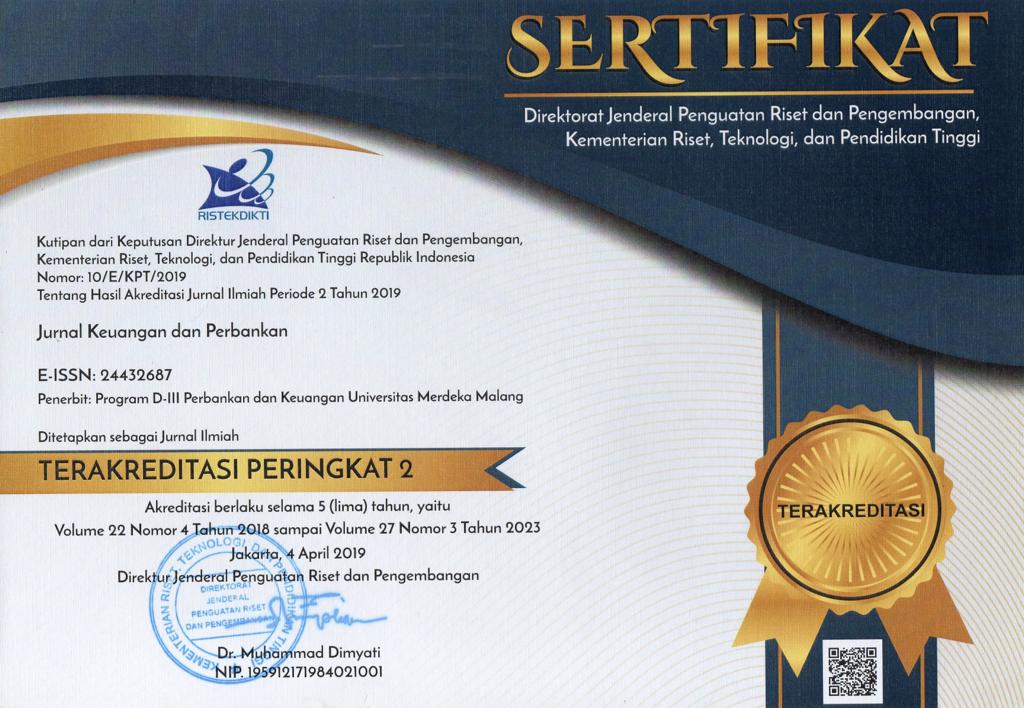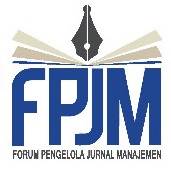Theory of planned behavior and whistleblowing intention
Abstract
This research examined the theory of planned behavior (TPB) as predictor whistleblowing intention. According to TPB, it is difficult to posit whistleblowing as actual behavior. Whistleblowing is more suited to be posited as intention. Intent means the likelihood of actual behavior occurred. We examined attitude, subjective norms, and perceived behavioral control as TPB variables. We also investigated a few control variables such as colleagues support, organizational support, and fear of retaliation. The online survey was conducted in obtaining data by a web-based questionnaire. Participants of this survey were employees of regional owned east java bank. The number of respondents was 112 employees from all departments and units. Validity, reliability, regression, and path analysis were used in testing research instrument and several hypotheses. The result showed that attitudes and subjective norms as TPB variables have a significant impact on whistleblowing intention. However, perceived behavioral control does not affect whistleblowing intention. While, among several control variables, only fear of retaliation that has a significant effect on whistleblowing intention. Furthermore, this study also found empirical evidence that knowledge and subjective norms have an indirect effect on whistleblowing intention through attitudes. This research suggests that regional owned east java bank should provide an environment and channels to support whistleblowing within effectively, especially through protection and/or reward systems, or etc.
JEL Classification: D23, G34, L23
DOI: https://doi.org/10.26905/jkdp.v23i1.2714
Keywords
Full Text:
PDFReferences
Ajzen, I. (1991). The theory of planned behavior. Organizational Behavior and Human Decision Processes, 50, 179–211. https://doi.org/10.1016/0749-5978(91)90020-T
Albrecht, S. L., & Carpenter, K. E. (2010). Attitudes as predictors of behavior versus behavior intentions: A convergence of research traditions. Sociometry, 39(1), 1–10.
Association of Certified Fraud Examiners. (2018). Report To The Nations 2018 Global Study on Occupational Fraud and Abuse.
Awang, Y., & Ismail, Z. (2018). Determinants of financial reporting fraud intention among accounting practitioners in the banking sector: Malaysian evidence. International Journal of Ethics and Systems, 34(1), 32–54.
Bobek, D. D., Roberts, R. W., & Sweeney, J. T. (2007). The social norms of tax compliance: Evidence from Australia, Singapore, and the United States. Journal of Business Ethics, 74(1), 49–64. https://doi.org/10.1007/s10551-006-9219-x
Bock, G.-W., Zmud, R. W., Kim, Y.-G., & Lee, J. (2005). Behavioral intention formation in knowledge sharing: Examining the roles of extrinsic motivators, social-psychological forces, and organizational climate. MIS Quarterly, 29(1), 87–111. https://doi.org/10.2307/25148669
Cassematis, P. G., & Wortley, R. (2013). Prediction of whistleblowing or non-reporting observation: The Role of personal and situational factors. Journal of Business Ethics, 117(3), 615–634. https://doi.org/10.1007/s10551-012-1548-3
Chang, Y., Wilding, M., & Shin, M. C. (2017). Determinants of whistleblowing intention: Evidence from the South Korean Government. Public Performance and Management Review, 40(4), 676–700. https://doi.org/10.1080/15309576.2017.1318761
Cho, Y. J., & Song, H. J. (2015). Determinants of whistleblowing within government agencies. Public Personnel Management, 44(4), 450–472. https://doi.org/10.1177/0091026015603206
Christophersen, T., & Konradt, U. (2011). Reliability, validity, and sensitivity of a single-item measure of online store usability. International Journal of Human-Computer Studies, 69(4), 269–280. https://doi.org/10.1016/j.ijhcs.2010.10.005
Cialdini, R. B., & Goldstein, N. J. (2004). Social influence: Compliance and conformity. Annual Review of Psychology, 55(1), 591–621. https://doi.org/10.1146/annurev.psych.55.090902.142015
Erikson, K., & Fallan, L. (1996). Tax knowledge and attitudes towards taxation; A report on a quasi-experiment. Journal of Economic Psychology, 17(3), 387–402. Retrieved from http://proquest.umi.com/pqdweb?did=39712230&Fmt=7&clientId=25620&RQT=309&VName=PQD
Feldman, Y., & Lobel, O. (2007). Behavioral versus institutional antecedents of decentralized enforcement in organizations: An experimental approach. Regulation & Governance, 2(2), 165-192. https://doi.org/10.2139/ssrn.1031853
Gundlach, M. J., Douglas, S. C., & Martinko, M. J. (2003). The decision to blow the whistle: A social information processing framework. Academy of Management Review, 28(1), 107–123. https://doi.org/10.5465/AMR.2003.8925239
Hwang, D., Staley, B., Chen, Y. Te, & Lan, J. S. (2008). Confucian culture and whistle-blowing by professional accountants: An exploratory study. Managerial Auditing Journal, 23(5), 504–526. https://doi.org/10.1108/02686900810875316
Krosnick, J. A., Narayan, S., & Smith, W. R. (1996). Satisficing in surveys: Initial evidence. New Directions for Evaluation, 70, 29–44.
Latan, H., Jabbour, C. J. C., & Jabbour, A. B. L. de S. (2016). Ethical decision-making theory: An integrated approach. Journal of Business Ethics, 139(4), 755–776. https://doi.org/10.1007/s10551-015-2886-8
Lewis, W., Agarwal, R., & Sambamurthy, V. (2014). Sources of influence on beliefs about information technology use: An empirical study of knowledge workers. MIS Quarterly, 24(4), 665–694. https://doi.org/10.2307/3250951
Lozano, L. M., García-Cueto, E., & Muñiz, J. (2008). Effect of the number of response categories on the reliability and validity of rating scales. Methodology, 4(2), 73–79. https://doi.org/10.1027/1614-2241.4.2.73
Madden, T. J., Ellen, P. S., & Ajzen, I. (1992). A comparison of the theory of planned behavior and the theory of reasoned action. Personality and Social Psychology Bulletin, 18(1), 3–9.
Mesmer-Magnus, J. R., & Viswesvaran, C. (2005). Whistleblowing in organizations: An examination of correlates of whistleblowing intentions, actions, and retaliation. Journal of Business Ethics, 62(3), 277–297. https://doi.org/10.1007/s10551-005-0849-1
Miceli, M. P., & Near, J. P. (1988). Individual and situational correlates of whistleblowing. Personnel Psychology, 41(2), 267–281. https://doi.org/10.1111/j.1744-6570.1988.tb02385.x
Near, J. P., & Miceli, M. P. (1985). Organizational dissidence: The case of whistle-blowing. Journal of Business Ethics, 4(1), 1–16. https://doi.org/10.1007/BF00382668
Park, H., & Blenkinsopp, J. (2009). Whistleblowing as planned behavior-A survey of South Korean police officers. Journal of Business Ethics, 85(4), 545–556. https://doi.org/10.1007/s10551-008-9788-y
Pillay, S., Ramphul, N., Dorasamy, N., & Meyer, D. (2015). Predictors of whistle-blowing intentions: An analysis of multi-level variables. Administration and Society, 50(2), 186-216. https://doi.org/10.1177/0095399715581621
Preacher, K. J., & Hayes, A. F. (2004). SPSS and SAS procedures for estimating indirect effects in simple mediation models. Behavior Research Methods, Instruments & Computers, 36(4), 717–731. https://doi.org/10.3758/BF03206553
Richardson, B. K., Wang, Z., & Hall, C. A. (2012). Blowing the whistle against Greek hazing: The theory of reasoned action as a framework for reporting intentions. Communication Studies, 63(2), 172–193. https://doi.org/10.1080/10510974.2011.624396
Ryan, M. J. (1982). Behavioral Intention formation: The Interdependency of attitudinal and social influence variables. Journal of Consumer Research, 9(3), 263. https://doi.org/10.1086/208922
Trongmateerut, P., & Sweeney, J. T. (2013). The influence of subjective norms on whistle-blowing: A cross-cultural investigation. J Bus Ethics, 112(3) 437–451. https://doi.org/10.1007/s10551-012-1270-1
Weijters, B., Cabooter, E., & Schillewaert, N. (2010). The effect of rating scale format on response styles: The number of response categories and response category labels. International Journal of Research in Marketing, 27(3), 236–247. https://doi.org/10.1016/j.ijresmar.2010.02.004
DOI: https://doi.org/10.26905/jkdp.v23i1.2714
Refbacks
- There are currently no refbacks.
Jurnal Keuangan dan Perbankan (Journal of Finance and Banking)
Diploma Program of Banking and Finance, Faculty of Economics and Business, University of Merdeka Malang
Published by University of Merdeka Malang
Mailing Address:
2nd floor Finance and Banking Building, Jl. Terusan Raya Dieng No. 57 Malang, East Java, Indonesia
Phone: +62 813-3180-1534
Email: jkp@unmer.ac.id
 This work is licensed under a Creative
This work is licensed under a Creative
Commons Attribution-ShareAlike 4.0




